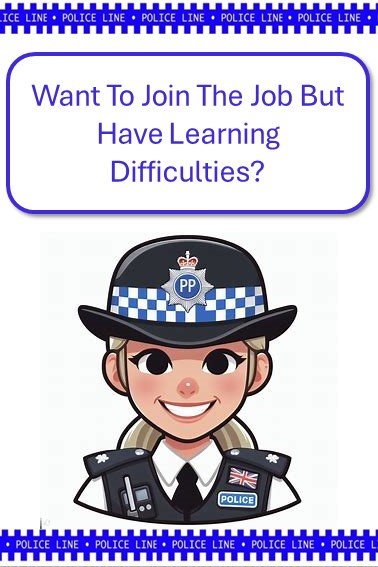Joining the police force can be an extremely rewarding career path. However, meeting the eligibility criteria is essential. One common question asked is whether you can join the police in the UK if you have learning difficulties.
What are Learning Difficulties?
Learning difficulties, also known as learning disabilities, affect how a person understands information and how they communicate.
The most common types include:
- Dyslexia – difficulty with reading, writing and spelling
- Dyscalculia – difficulty with maths and numbers
- Dyspraxia – problems with coordination and movement
- ADHD – trouble focusing and controlling behavior
- Autism – challenges with communication and social skills
Around 1 in 5 people in the UK have some form of learning difficulty. These conditions can range from mild to severe.

Joining The Police With Learning Difficulties
The UK police force aims to be diverse and inclusive. They do not discriminate against disabilities or health conditions. However, meeting the eligibility criteria is still essential.
Some key requirements for joining the police include:
- Being aged 18+ at time of application
- Holding a full UK driving licence
- Meeting the fitness requirements
- Passing exams and tests
During the application process your learning difficulty will be taken into account.
Considerations With Specific Learning Difficulties
- Dyslexia – This is one of the most common learning difficulties. Around 10% of the population has dyslexia. You can still join the police with dyslexia. However, you may get support such as extra time in exams. Reading and writing is a key police skill so you need to demonstrate you can do this effectively. Using tools like readers and spell checkers is allowed.
- ADHD – Attention and impulsivity challenges caused by ADHD could impact working as an officer. However, with effective management strategies many people with ADHD thrive in the police. You may need to disclose your condition to access support.
- Autism – Each autistic individual has different strengths. Good visual, mathematical and analytical skills could be very useful in policing. But communication and teamwork may require extra support. Disclosing your autism means reasonable adjustments can be made.
- Dyspraxia – Problems with movement and coordination could affect meeting the physical demands of the job. But this doesn’t always rule out police work if addressed properly. Adaptations could include more time to learn drill procedures.
Disclosing Your Learning Difficulty
Ideally you should disclose any learning difficulty early in the recruitment process. This allows reasonable adjustments to be considered.
However, disclosing is your personal choice.
Under the Equality Act you do not have to reveal any disability or health condition unless it impacts meeting the job criteria.
Getting Support With The Recruitment Process
There are various ways to get support when applying to join the police:
- Ask about reasonable adjustments – This can include extra time, reading assistance or adaptations to tests.
- Seek mentoring – Some forces offer mentoring schemes for candidates with learning difficulties. This provides advice and support through the process.
- Use assistive technology – Tools and apps like text readers, voice recognition, spell checkers and digital organizers can assist you.
- Join police support networks – Many forces have networks for disabled officers and recruits where you can get peer advice.
- Talk to your specialist – Discuss your goal of joining the police with specialists like educational psychologists, dyslexia tutors or autism charities. They can suggest helpful strategies.
Meeting The Requirements With Learning Difficulties
While having learning difficulties does not exclude you from the police, you still need to meet the eligibility criteria. Some key requirements include:
Physical Fitness
- All officers must pass a fitness test. This involves a shuttle run and other exercises to assess endurance and strength.
- Any coordination challenges caused by your learning difficulty may mean extra practice is needed. But with preparation, meeting the standards is achievable.
Exams and Assessments
- Sitting a series of exams and tests is part of the application process. Reasonable adjustments like extra time can be arranged.
- You will need to demonstrate a good level of written and numerical skills. Using spellcheckers and other aids is acceptable to compensate for any difficulties.
Driving Licence
- Holding a full manual UK driving licence is essential. If your learning difficulty impacts your driving ability you need to declare this and may require an adjusted licence.
Probation
- All new recruits complete a 2 year probation period. This assesses your competency to perform general police duties.
- If you need any specific support or reasonable adjustments, requesting these early in your probation helps you fulfil your duties effectively.
Final Thoughts: Can I Join The Police With Learning Difficulties?
Learning difficulties are diverse so each applicant’s situation is considered individually. Disclosing your condition and seeking support can help you successfully join and serve as an officer.
With commitment and preparation, a policing career is achievable and rewarding for many people with learning difficulties. Core skills like teamwork, problem solving and communication can be great strengths.
The police aim to create an inclusive workforce that reflects the community. So applications from capable individuals with learning difficulties are welcomed.



